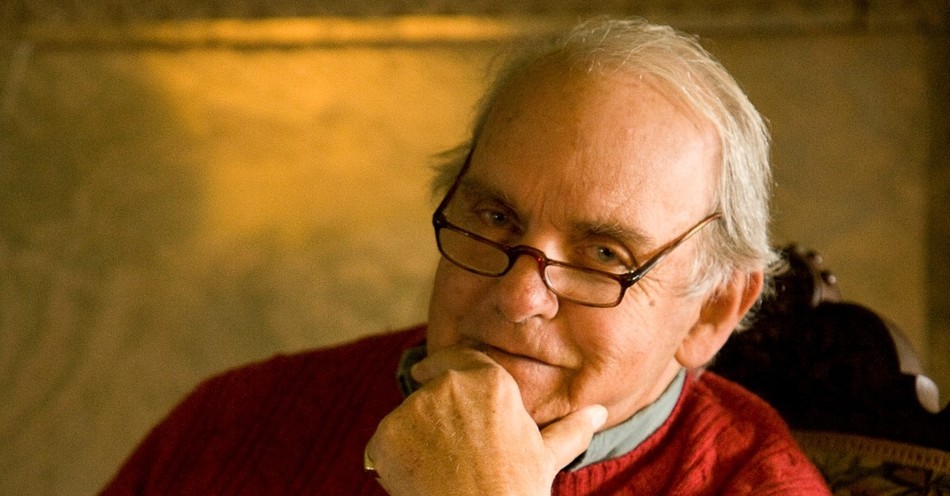1. He didn’t have a Christian upbringing. Unlike many religious writers, Buechner came from a secular background with a certain pedigree. His family was affluent, non-religious New York stock (his father was one of F. Scott Fitzgerald’s friends at Princeton). After his father’s suicide, his mother moved the family to Bermuda for several years. Later he attended a boarding school in New Jersey and graduated from Princeton. By his admission, Buechner was surprised as anyone else when he became a Christian.
2. He almost became a different kind of writer. Before graduating from seminary (and maybe for a few years afterward), Buechner seemed to be becoming a standard East Coast literary novelist. He was a lifelong friend of Pulitzer Prize-winning poet James Merrill. He won an O. Henry Award for his short story “The Tiger,” published in the New Yorker. The year after he graduated from seminary, Playhouse 90 adapted his third novel for TV. At Exeter, his students included future novelist John Irving (The Cider House Rules, A Prayer for Owen Meaney). It wasn’t until the 1980s that most evangelical Christians discovered his work, leading to Buechner teaching at Wheaton College in 1985.
3. He has wide influences. While Buechner cited many classic writers (Herman Melville, Shakespeare, Mark Twain) he admired, he had an eclectic mix of influences. His theology books referenced C.S. Lewis and Paul Tillich. He expressed admiration for Charles Williams’ metaphysical thrillers and L. Frank Baum’s Oz stories. Wheaton College’s profile of Buechner mentions many other influences, including Friedrich Schleiermacher, E. Nesbitt, and Louis Armstrong.
4. He struggled from early success. In the decades since A Long Day’s Dying appeared, Buechner distanced himself from it. In his introduction to The Book of Buechner, Buechner said that seeing Brown mention that book first felt like “hanging my baby pictures in the front hall.” At the same time, he admitted in The Sacred Journey that ever since A Long Day's Day was published, he felt driven “to write something, to do something, to be something to justify the fluke of that early and for the most part undeserved success.”
5. He didn’t write “Christian fiction.” Buechner observed in Now and Then that many people automatically assume a novel written by a minister will be “essentially a sermon with illustrations.” However, his experience at Exeter pushed him to explain religious ideas without standard religious language. As a result, his novels were written for what Munroe calls “the religiously indifferent reader.” Even his novels about Biblical characters (such as The Son of Laughter) feature paradox and complex choices.
6. He wasn’t an average minister. While Buechner was ordained as a minister, he was ordained as an evangelist and said he preferred to be seen as an apologist. Instead of pastoring churches, Buechner used his credentials to preach sermons and write theology books, with the same goal as his novels: “I always hope to reach people who don’t want to touch religion with a ten-foot pole.” His sermons also encouraged many ministers seeking new ideas or language, including Russell Moore.
7. He wasn’t afraid to talk about doubt. Buechner’s nonfiction had several recurring themes, one being that doubt and faith can live alongside each other. In Secrets in the Dark, he wrote, “there is doubt hard on the heels of every belief… but faith waits even so.” Many readers have discussed how Buechner’s openness to discussing doubt has helped them in spiritual crises.
8. He kickstarted spiritual memoirs. Munroe observes that memoirs about one’s spiritual journey aren’t new, but the modern subgenre, with its emphasis on inward journeys, didn’t take off until after 1982 when Buechner published The Sacred Journey. As Munroe puts it, that book “started an avalanche,” making room for memoirists like Anne Lamott.
9. He had a different view of saints. Many characters in Buechner’s novels are disreputable people—Leo Bebb runs a theology diploma mill, and Godrick commits a terrible sexual sin. However, Buechner argued that these characters are all saints in varying ways. They do not get everything right, but they become surprising “life-givers” that God uses to enrich their surroundings.
10. He had a sense of humor. Buechner gained many fans for writing honestly about doubt and telling stories about religious people who are very human. Religious stories about doubt and flawed characters can be very dark, as in the case of Shusako Endo’s novel Silence. However, Buecher wrote comedy as well as darkness. His Leo Bebb stories and later books like On the Road with the Archangel are occasionally risqué but very lighthearted.







